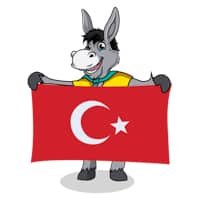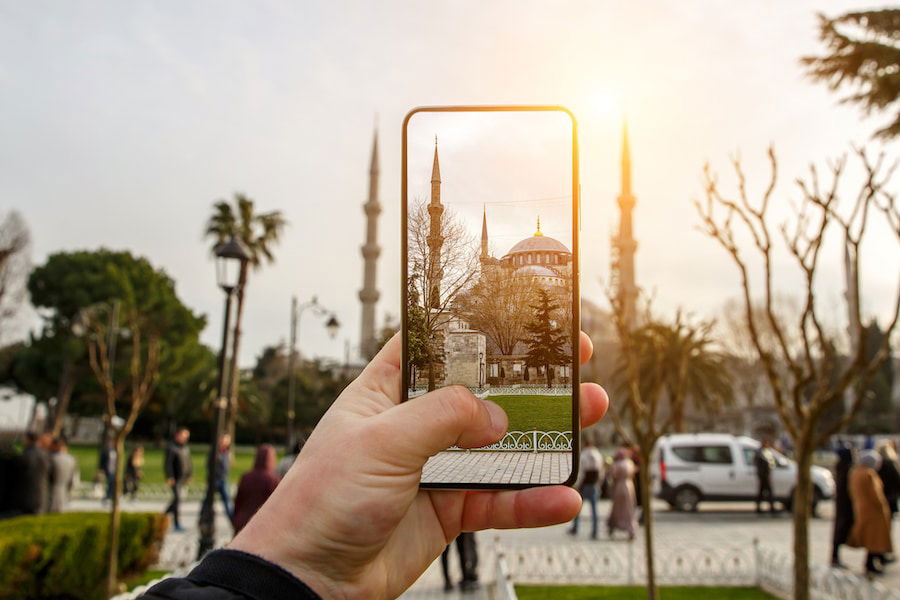I am here with answers to all your questions about Istanbul in Ramadan 2025—food, safety, what to expect, and more!
All my advice about planning to visit Istanbul during Ramadan is based on my 12 years of being in Istanbul during Ramadan every year!
I hope you enjoy the Islamic Holy month of Ramadan experience in Istanbul and in my beautiful country.
In 2025, the month of Ramadan, a pivotal period in the Islamic lunar calendar, is expected to start on the evening of February 28th. Visitors planning to experience Ramadan in Istanbul should note that the fasting begins at sunset and will extend until either Sunday, March 30th, or Monday, March 31st.
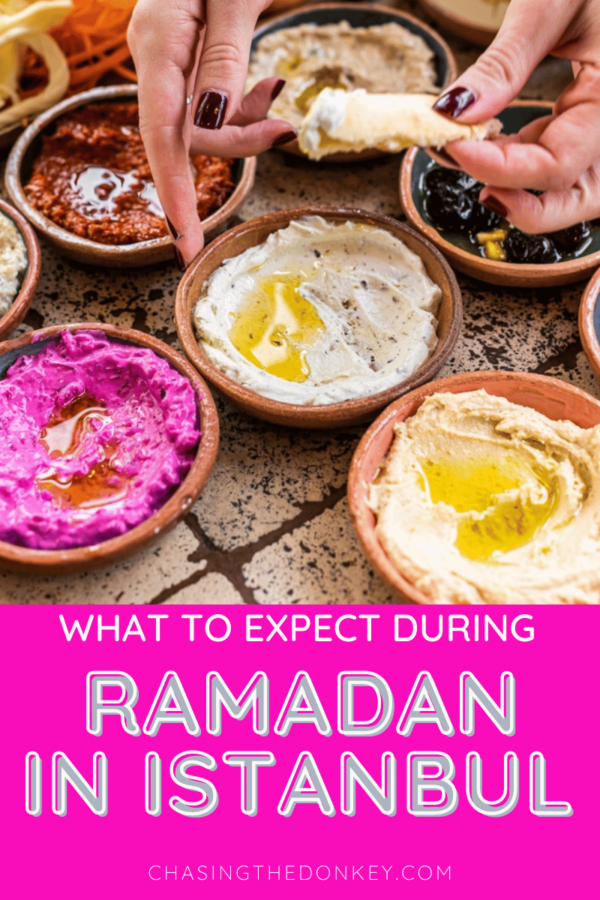
If you’re lucky enough to be visiting Istanbul at any time during the year, you’re in for a treat. This is a city that has more history within it than many countries do!
It’s also a huge assault on the senses in the best way possible. Istanbul is a city for all seasons, but many people have questions about what to expect if they’re visiting during Ramadan.
Skip Ahead To My Advice Here!
What Is The Month Of Ramadan In Turkey
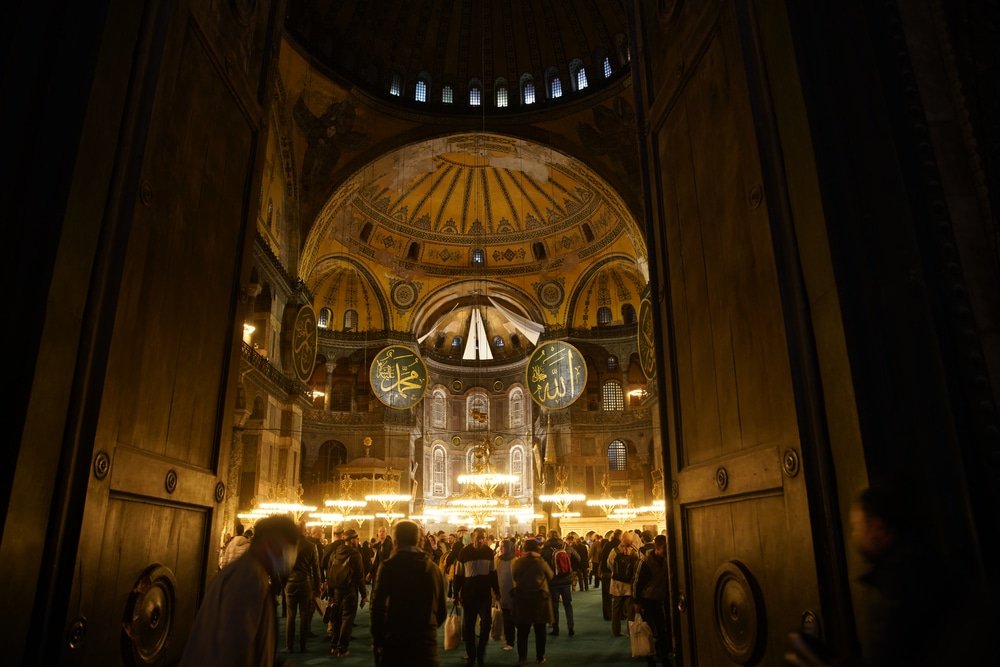
First, the holy month of Ramadan doesn’t fall at the same time every year, so you will need to check ahead of time when it is for that particular year.
To work out the Ramadan calendar, you’ll need to know that it is the ninth month of the Islamic calendar, but this is a lunar calendar, which means it shifts every year, being 11-12 days shorter than the Gregorian calendar.
Ramadan is 30 days of fasting, self-reflection, good deeds, and prayer.
From sunrise to sunset, Muslims observing Ramadan do not eat or drink and avoid bodily pleasures. No alcoholic beverages are consumed during this month.
During Ramadan, observers are likely to read the Quran, pray more often, attend lectures, and help with charitable events. The entire month helps Muslims feel closer to God and is a precious time.
Just before sunrise, Muslims will share suhoor, which is a community meal before fasting begins. This is typically enjoyed with family members. Then, once the sun sets, the iftar meal takes place. This is the breaking of the fast and a Ramadan feast that people also enjoy together. You will typically see traditional restaurants quite full around this time.
Once the month is over, Eid al-Fitr takes place, which is a huge three-day celebration that brings families and friends together. It is also known as the Festival of Sweets; you’ll find people giving you sweets, and it’s customary to take them!
Will The Time Of Ramadan In Istanbul Ruin Your Trip
The timing of Ramadan in Istanbul will not ruin your trip. There may be some adjustments and considerations to keep in mind; many people still enjoy visiting Istanbul during Ramadan and find it to be a unique experience, so I am sure you will also. Try to absorb the spirit of Ramadan as it is intended.
Frequently Asked Questions About Ramadan In Istanbul
Ramadan in Istanbul is a special time, transforming the city with a unique atmosphere. This month of the lunar calendar invites visitors to experience the rich traditions and vibrant spirit of Ramadan. Istanbul comes alive during this holy month.
Understanding how Ramadan affects daily life and attractions can enrich your visit. Come to Istanbul during Ramadan to witness the city’s special rituals, from the mosques to the lively streets and restaurants.
How Will Ramadan 2025 Affect You
As Ramadan is a significant religious observance for Muslims, there may be a small impact on your trip to Istanbul or any Muslim country you plan to visit. Here are some ways in which Ramadan might affect you while in Turkey:
| Aspect | Effect on you |
|---|---|
| Business Hours | Some restaurants and cafes may be closed during the day and open only in the evening. |
| Tourist Attractions | Major tourist attractions and historical sites remain open but may have shorter operating hours. |
| Cultural Events & Experiences | You can witness special events, festivals, and iftar gatherings during Ramadan. |
| Limited Alcohol Availability | Alcoholic drinks during Ramadan may be restricted in some regions. |
| Public Transport | Transport schedules may be altered, particularly in the evenings during iftar time. |
| Respect Local Customs | There are no specific Ramadan travel rules, but avoiding eating, drinking, or smoking in public areas during fasting hours might be a good idea as a sign of respect. |
| Hotel Services | Hotels may continue to provide regular services, but you should check for any meal timings or other service changes. |
Brands We Use And Trust
What To Expect During Ramadan In Istanbul
As a visitor to Istanbul, you probably won’t notice anything very different. All restaurants, cafes, and bars are open, except for possibly the first day of Ramadan and during the Eid al-Fitr celebration.
Visiting Tourist Attractions & Must-See Mosques In Istanbul During Ramadan
You might wonder whether you’re able to visit the Blue Mosque and other usual sights and mosques in Istanbul during Ramadan, and the answer is yes. The only thing to remember is that during prayer times, when you hear the call to prayer, non-Muslims will be asked to leave the mosque until prayers are over. This is no different from times outside of Ramadan.
Are Restaurants In Istanbul Open During Ramadan?
During Ramadan in Istanbul, restaurants’ operating hours and practices may undergo slight changes to accommodate the fasting period and the observance of iftar (the time to break the fast) and suhoor (pre-dawn meal) times. Here are some common practices that restaurants in Istanbul may follow during Ramadan:
- Limited daytime operations: many restaurants in Istanbul adjust their operating hours during the daytime to respect the fasting period. As Muslims are fasting from dawn to sunset, some – but certainly not all, eateries may choose to remain closed or have limited services during daylight hours
- Special iftar menus: restaurants that operate during the day may offer special iftar menus specifically designed for the evening meal when Muslims break their fast. These menus often feature traditional dishes and beverages that are popular during Ramadan, providing a unique dining experience
- Reservations & pre-booking: as iftar time approaches, popular restaurants may see an influx of reservations, especially for group gatherings or special events. It’s advisable to make reservations in advance if you plan to dine out during iftar to secure a table at your desired restaurant
- Iftar tables: Many hotels and upscale restaurants in Istanbul offer iftar buffets, which provide a wide array of food options to cater to different preferences. These buffets usually include traditional Turkish cuisine, Middle Eastern specialties, and a variety of desserts
- Vibrant evening atmosphere: After sunset, when Muslims break their fast, every street in Istanbul comes to life with a lively atmosphere. Restaurants that were closed during the day will now open their doors, and people gather to enjoy iftar together. This creates a festive ambiance that you can experience while dining out in the evening
- Suhoor options: the pre-dawn meal before the fasting day begins is typically consumed at home. However, some restaurants and cafes may offer suhoor menus or stay open late into the night to cater to those seeking a meal before the fasting hours begin
It’s important to note that not all restaurants in Istanbul follow these practices, and plenty of dining options remain available during Ramadan in Istanbul.
When Should You Eat
If you’re not participating in Ramadan, you can eat any time you want, but show some consideration by not eating in the street. Restaurants will be open, and you won’t upset anyone by eating during the day in this type of setting; businesses would suffer terribly if everyone did this.
But if you want to give it a try and really understand the people around you who are fasting, why not go for it? It will undoubtedly help you understand a lot more.
What Is The Ramadan Feast
During Ramadan in Turkey, the array of traditional dishes to savor is never-ending. After the fast during the day, you will find restaurants serving Turkish food, such as:
Dates and Water. Initiating the fast-breaking meal in line with Prophet Muhammad’s tradition, dates paired with water are a customary choice.
Iftar Soup (Çorba). This welcoming, warm soup comes in varieties like lentil, chickpea, or wheat, marking the beginning of the Iftar meal.
Pide. Essential for Ramadan, this Turkish flatbread, sprinkled with sesame seeds, complements cheese, olives, or honey perfectly.
Börek. A favored savory treat, Börek is a pastry filled with cheese, spinach, minced meat, or potatoes, frequently enjoyed during Ramadan.
Kebabs. For Iftar or Suhoor, grilled meat kebabs, including lamb or chicken, are a widespread indulgence.
İçli Köfte. Bulgur and minced meat dumplings, often accompanied by lemon and lettuce, serve as a beloved Ramazan snack or appetizer.
Lentil Dishes. Lentils play a pivotal role in Turkish Ramadan cuisine, featured in dishes like Mercimek Koftesi (lentil patties) and Lentil Soup.
Dolma and Sarma. These include stuffed grape leaves (dolma) and vegetables like peppers and eggplants (sarma) filled with rice, spices, and occasionally ground meat.
Traditional Desserts And Sweets. To cater to sweet tooth cravings post-Iftar, Turkish delights like Baklava and Güllaç are popular, the latter being a rosewater and milk dessert adorned with pomegranate seeds and thin pastry sheets.
Fresh Fruits. A refreshing selection of fruits, including watermelon, apricots, and pomegranates, often conclude the Ramazan meal.
Yogurt and Dairy Products. Valued for their nutritional benefits, yogurt, and dairy items are staples in both Suhoor and Iftar meals.
Tea and Turkish Coffee. To accompany Suhoor or conclude the Iftar meal, traditional Turkish tea, and coffee are the beverages of choice.
Safety In Istanbul During Ramadan
Yes, it is safe to visit Istanbul during Ramadan. Istanbul is a cosmopolitan city that welcomes you throughout the year, including during the holy month of Ramadan. However, as with any travel destination, it’s important to exercise general safety precautions and be aware of certain considerations during your visit.
Here are some points to keep in mind:
- Security: Istanbul is a major tourist destination and has security measures in place to ensure the safety of residents and visitors. It’s always advisable to stay updated on the current security situation by consulting travel advisories and local authorities. Additionally, remain vigilant, especially in crowded touristy areas and busy hotspots, and take precautions to protect your belongings
- Respect local customs: during Ramadan, it’s essential to respect local customs and traditions. Dress modestly when visiting religious sites, like mosques, and avoid eating, drinking, or smoking in public during fasting hours out of consideration for those who are observing the fast
- Public transportation: public transport may be affected during Ramadan, particularly during iftar time when people rush to reach their homes or mosques
As you can see, being in Istanbul to witness the spiritual atmosphere of Ramadan will be an excellent time for you. While it is the holy month of fasting, your time in Istanbul will still be wonderful. From the bustling Sultanahmet Square and beyond, this special month is observed with colorful lights, Ramadan drummers, and, of course, the usual Turkish hospitality.
If it will be your first time enjoying the blessings of Ramadan in a Muslim country, you will be in for a good time.
How To Act Appropriately During Ramadan
While nobody expects you to act a certain way during Ramadan, it is common sense and respect to understand what is happening and show empathy. A few ways to do that include:
- Not eating or drinking on the street: while you can totally do this, it’s probably not going to help someone who cannot eat or drink until the sun goes down. Nobody will be offended, but it’s considerate to avoid this if you can. The same goes for smoking
- Dress modestly: again, there are no specific rules here, but avoid anything too out there when walking around. Of course, if you’re planning on visiting a mosque, you’ll need to dress respectfully anyway and certainly carry a headscarf in your bag if you’re a woman, as you’ll need one
- Don’t be impatient: Ramadan can be a busy time in Istanbul, and you might see queues for taxis, in restaurants after sundown, and when visiting significant mosques such as the Blue Mosque or Süleymaniye Mosque. Be patient and be happy that you’re in Istanbul!
Move This Adventure To Your Inbox & Get An Instant Freebie

No spam. Unsubscribe at any time.
Prayer Times For Ramadan In Istanbul
Muslims pray five times daily, and the prayer times during Ramadan vary depending on the location and the specific date within the month.
The timing of the five daily prayers (Fajr, Dhuhr, Asr, Maghrib, and Isha) shifts throughout the year due to the changing position of the sun. During Ramadan, Muslims also observe additional prayers, such as Taraweeh, which are performed after Isha.
To determine the prayer times during Ramadan in Istanbul, it is best to refer to local Islamic centers, mosques, or Islamic organizations that provide accurate and up-to-date prayer timetables. These timetables are usually available online, through mobile apps, or displayed at mosques.
It’s important to note that prayer times may vary slightly between different sources due to differences in calculation methods or local customs.
Therefore, relying on trusted and reliable sources for accurate prayer time information during Ramadan is advisable.
Wrap Up On Istanbul Throughout Ramadan
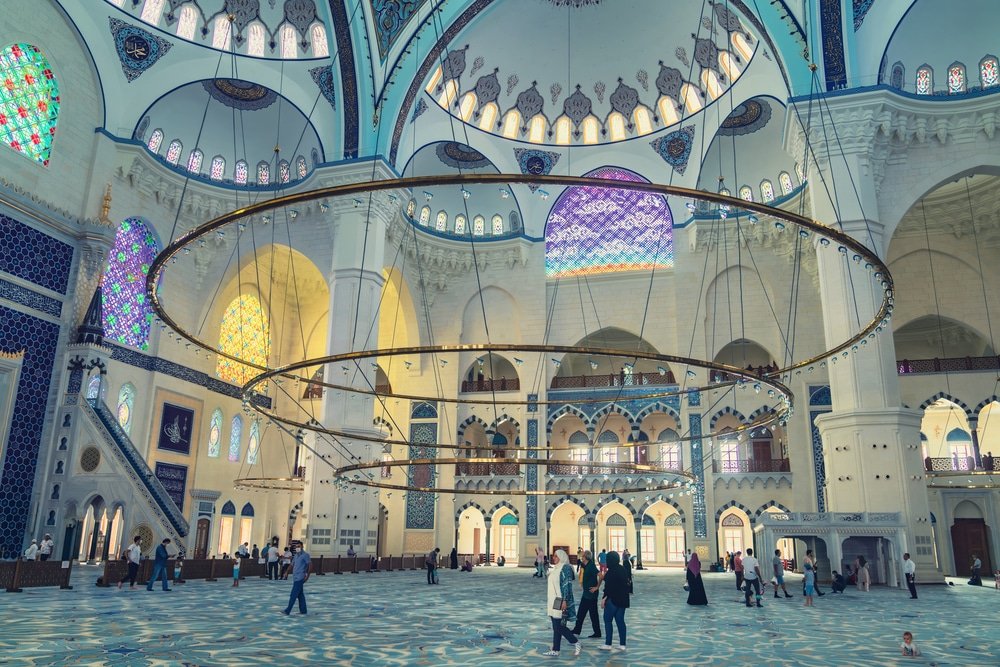
So, really, there will be no difference for you as a tourist, but it is good to learn more about Ramadan so you know what people are doing and why. Also, do remember that going without food or water during the day is hard, and if someone seems a little tired or not as cheerful as they could be, that is why. Bear it in mind and show some empathy.
To sum up, visiting Istanbul in Ramadan isn’t a lot different for a non-Muslim. Everything will remain open, and you can still explore the city to your heart’s content. However, it’s respectful to know about the holy month and to understand what people are doing and why. You’ll find that your visit is enriched even more by showing a little empathy.
And if you’re visiting during Eid al-Fitr, well, be ready for a celebration!

